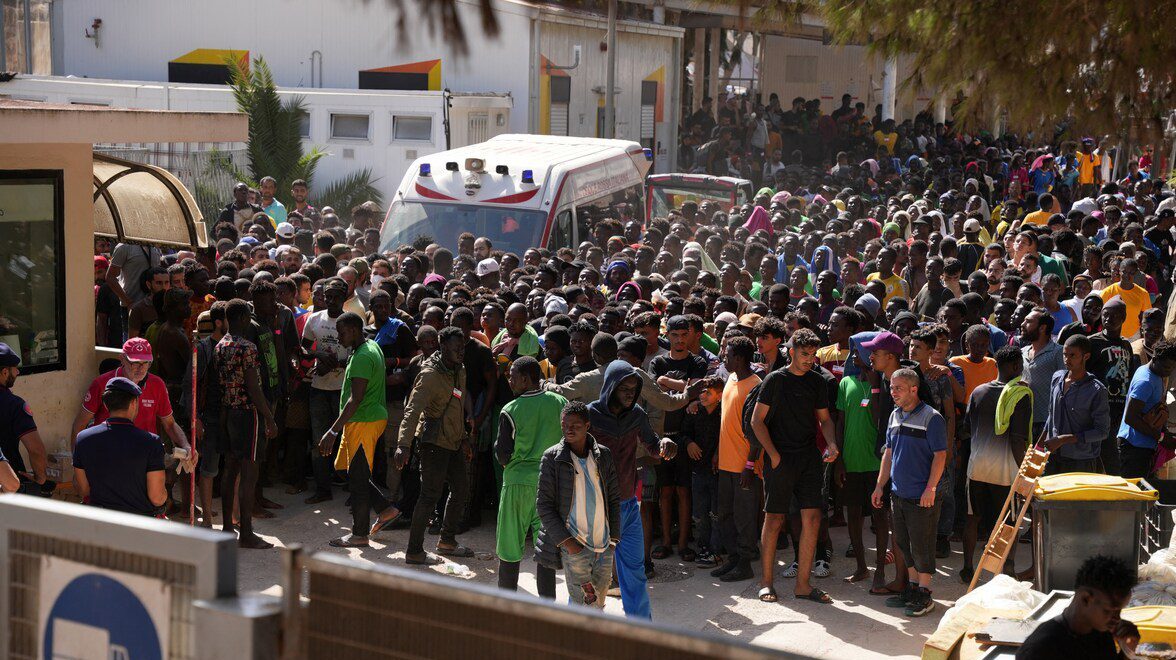
Migrants wait at the operational centre to receive registration papers from the Red Cross on the Italian island of Lampedusa, on September 17, 2023.
Photo by Zakaria ABDELKAFI / AFP
“The stakes are enormous,” Polish Prime Minister Mateusz Morawiecki said at a news conference on Wednesday, September 20th, referring to the upcoming Polish parliamentary elections and the nationwide referendum, both to be held on October 15th. Morawiecki said the previous government, led by the centrist Civic Platform (PO), now the main opposition party, created poverty and unemployment, raised the retirement age, and sought to admit illegal migrants to Poland on a mass scale.
Conservative party Law and Justice (PiS)—in power since 2015—is seeking a third consecutive victory in parliamentary elections, and has made its opposition to illegal migration a central campaign theme. A referendum will be held on the same day as the election, and one of the questions will ask voters whether they “support the admission of thousands of illegal immigrants from the Middle East and Africa, in accordance with the forced relocation mechanism imposed by the European bureaucracy?”
The public debate about migration escalated in Poland after the EU adopted a controversial migrant redistribution scheme in June, with member states having to accept refugees from frontline member states or pay a financial contribution under a “mandatory solidarity” mechanism. Hungary and Poland were the only member countries that vetoed the proposal and vowed to not comply with it if implemented. The debate has become even more heated with news about the Italian island Lampedusa being overwhelmed by thousands of illegal migrants.
🔴 Na południu Europy mamy do czynienia z kolejną wielką falą nielegalnych imigrantów.
— Prawo i Sprawiedliwość (@pisorgpl) September 19, 2023
Potrzebujemy europejskiego planu walki z problemem, którego symbolem jest dziś włoska Lampedusa.
Tym rozwiązaniem nie jest relokacja nielegalnych migrantów. Dlatego nasz rząd przyjmie dziś… pic.twitter.com/1sbU4LxcCf
“Lampedusa is only a kind of symbol of a situation that threatens the whole of Europe, including Poland,” PiS leader Jarosław Kaczyński told a news conference on Tuesday, September 18th, after the government adopted a special resolution, urging the European Commission to “take appropriate and immediate action to stop an illegal influx of people to the EU” and to “drop proposals that encourage illegal migrants to come to EU countries.”
Kaczyński added:
The only way to fight this kind of—it must be called this—invasion is to actually, realistically seal the borders and make decisions to return those who crossed the borders to their home countries, or some other solution, but always related to getting rid of them.
He said that any announcement of the relocation of illegal migrants is an “encouragement to traffic people.”
At the same press conference, Mateusz Morawiecki warned:
The whole of Europe, the whole of the EU, may become Lampedusa if we continue to commit the same old mistakes, the scheme and mechanisms that the [European] Commission proposed.
The government’s election strategy seems to be working, as PiS is increasing its lead over PO. According to the latest polls, United Right, the alliance of parties led by Law and Justice, is leading with 39%, while the alliance, led by former prime minister Donald Tusk and PO, is predicted to receive 30% of the votes.
Migration is also a hot topic in neighbouring Slovakia, where elections are set to take place on September 30th. Robert Fico, former Prime Minister and leader of the opposition Social Democrats (Smer), urged the government to temporarily close Slovakia’s borders with Hungary to stop illegal migrants from entering the country. The number of illegal migrants detained in Slovakia has increased ninefold from a year ago to more than 27,000 so far this year, Reuters reported. A recent survey found that 78% of voters want the incoming government to be tougher on illegal migration.
By opposing mass migration to Europe and denouncing the meddling of EU institutions and U.S. billionaire George Soros in Slovakia’s internal affairs, Fico has found allies on the conservative political scene, such as Prime Minister Viktor Orbán of Hungary. Smer is predicted to win the election with 22% of the votes, but it remains to be seen whether the party can form a government with like-minded forces.
